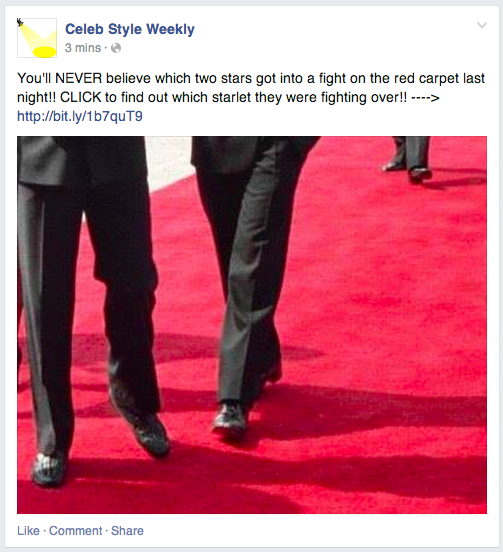Facebook Targets Click-Bait In Your News Feed
People have been gradually turning against “click-bait” for a while now and using the questionable tactic to attract attention may finally be accompanied by some real consequences according to an announcement from Facebook today.
According to the announcement, the social platform is rolling out an update to the News Feed algorithm that will help reduce the number of misleading or purposely vague headlines by incorporating the amount of time users spend reading a page as a signal.

“‘Click-baiting’ is when a publisher posts a link with a headline that encourages people to click to see more, without telling them much information about what they will see,” Facebook research scientist Khalid El-Arini and product specialist Joyce Tang wrote in a blog post. ”
“Posts like these tend to get a lot of clicks, which means that these posts get shown to more people, and get shown higher up in News Feed.”
Click-bait certainly is effective, but this strategy has become so prominent that even casual internet users are becoming familiar with the phrase. More importantly, the majority appear to agree they don’t like it. 80% of Facebook users say they prefer headlines that give them a fuller picture about what’s behind the link instead.
Here’s Facebook’s explanation of how they are aiming to take down click-bait:
One way is to look at how long people spend reading an article away from Facebook. If people click on an article and spend time reading it, it suggests they clicked through to something valuable. If they click through to a link and then come straight back to Facebook, it suggests that they didn’t find something that they wanted. With this update we will start taking into account whether people tend to spend time away from Facebook after clicking a link, or whether they tend to come straight back to News Feed when we rank stories with links in them.
Another factor we will use to try and show fewer of these types of stories is to look at the ratio of people clicking on the content compared to people discussing and sharing it with their friends. If a lot of people click on the link, but relatively few people click Like, or comment on the story when they return to Facebook, this also suggests that people didn’t click through to something that was valuable to them.






Leave a Reply
Want to join the discussion?Feel free to contribute!